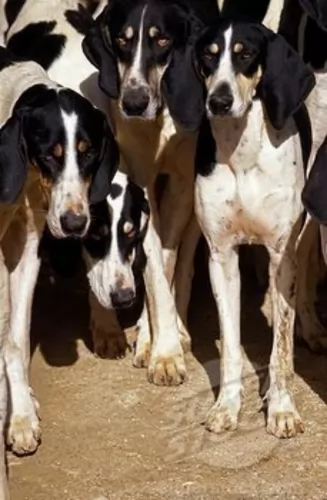 Petzlover
PetzloverFrancais Blanc et Noir is originated from France but Mixed is originated from United States. Francais Blanc et Noir may grow 38 cm / 14 inches shorter than Mixed. Francais Blanc et Noir may weigh 80 kg / 176 pounds lesser than Mixed. Francais Blanc et Noir may live 5 years less than Mixed. Francais Blanc et Noir may have less litter size than Mixed. Both Francais Blanc et Noir and Mixed requires Moderate Maintenance.
 Translated from the French Chien Francais Blanc et Noir, is the French White and Black Hound. His ancestry goes back before the French Revolution to the old Hound of Saintonge and the Gascon Saintongeois. The Francais Blanc et Noir was bred to be a hunting dog and he is a scent hound. They were dogs that went hunting in packs, mostly for Roe and Red deer. In the late 19th Century, the Gascon Saintongeois was crossed with the Poitevin and the result was the Francais Blanc et Noir.
Translated from the French Chien Francais Blanc et Noir, is the French White and Black Hound. His ancestry goes back before the French Revolution to the old Hound of Saintonge and the Gascon Saintongeois. The Francais Blanc et Noir was bred to be a hunting dog and he is a scent hound. They were dogs that went hunting in packs, mostly for Roe and Red deer. In the late 19th Century, the Gascon Saintongeois was crossed with the Poitevin and the result was the Francais Blanc et Noir.
The breed was recognized in 1957 and by 2009 there were about 2000 dogs registered with the Federation Cynoloqique Interenationale. There are three types of the Francais line. They are the Chien Francais Tricolor and Chien Francais Blanc et Orange. The Blanc et Noir was bred as a hunting dog and they remain that especially in France. However, they are also very popular in dog shows. Because so many dogs belonged to hunters who felt no compulsion to register them, they were not recognized internationally for many decades later than they should have been.
Following the Second World War, breeding programs were in chaos and hunters were abandoning dogs that they could not feed. The military killed many dogs also. The Chien Francais Blanc et Noir saw its ranks greatly depleted but the breed survived. After being recognized in 1957 by the CKC and FCI, they gained international attention for the first time. Even though the breed is rare its numbers are greater than either of the other Chien Francais types. The breed registers 200 to 400 new dogs every year.
They are still endangered though because there are very few dogs left outside of France.
The UKC has recognized the breed but the AKC doesn’t.
Many people are inclined to think that mixed breed or cross-breed dogs, also known as mutts or mongrels or designer dogs are just pavement specials. They think they look nothing much better than junkyard mutts.
This may be so, but not always, and these mixed breed dogs always seem to have hearts of gold. A Mixed breed is a dog that has parent’s who aren’t registered and who come from different breeds. In other words the parents aren’t of the same breed.
Guessing a cross breed’s ancestry can be difficult as these mixed-breeds have more genetic variation than pure breeds. They've been around since ancient times. The dogs originate in different countries and they all have different coats, different sizes and different temperaments.
It is sad but true – there are literally millions of mixed dogs worldwide, some of which never know what it is to live with- and be lovingly cared for by a human being.
 Being a pack hunting dog, the Francais Blanc et Noir is muscular and lean. A long legged athletic breed with long drop ears, a domed head, and flews overhanging the lower lip. The coat is black and white, with black and blue ticking. There are tan dot on the cheeks and above the eyes and also below the tail. These spots of pale tan color can also appear on the dog’s legs. The Francais Blanc et Noir is known for its scenting ability and for its great voice. With its athletic build it is also known for its ability to persevere
Being a pack hunting dog, the Francais Blanc et Noir is muscular and lean. A long legged athletic breed with long drop ears, a domed head, and flews overhanging the lower lip. The coat is black and white, with black and blue ticking. There are tan dot on the cheeks and above the eyes and also below the tail. These spots of pale tan color can also appear on the dog’s legs. The Francais Blanc et Noir is known for its scenting ability and for its great voice. With its athletic build it is also known for its ability to persevere
Sometimes Mixed dog breeds come about from two dogs meeting on the streets and mating or it could be two pure-breeds accidentally mating, resulting in a mixed breed.
The mixed breed dog puppy could inherit looks from just the one purebred parent so that he grows up looking like a pure-breed. With a cross breed the standard for breeding isn’t the same for purebreds where the appearance and temperament is more or less the same.
A mixed breed dog doesn’t have these standards to conform to and they are as varied and unique as the colors in the rainbow. It’s not possible to know what a mixed breed dog’s puppies will look like. A typical example of a mixed breed is a Labradoodle. People love the temperament of the Labrador but they want the low shedding qualities of the Poodle as well.
Mixed breed dogs can be small or large and that means different litter sizes. If you don’t want your Mixed dog breed becoming a parent, you can spay or neuter your dog.
There are many people who avoid choosing a ridiculously high priced pure breed puppy and they prefer to choose a mixed breed. This is partly because these mixed breed dogs are healthy, resilient and nearly always a good match for you and your family.
 They are good with children as long as the children are not overly rambunctious.
They are good with children as long as the children are not overly rambunctious.
He is a large active dog that would not be adaptable to apartment or city life.
The breed is very smart and easily trainable.
Doesn’t matter what your Mixed breed dog looks like – he is a unique individual and you can never really predict what kind of a character he will turn out to be.
He might inherit a bit of placid behavior from one parent and a bit of clownish behavior from the other. It’s what makes them so special.
Ask most dog lovers who have owned a mixed breed and you will usually hear them say that they wouldn’t trade their amazing loyal and devoted pet for all the money in the world.
 The Francais Blanc et Noir has the propensity for several minor and a few major health problems. These include:
The Francais Blanc et Noir has the propensity for several minor and a few major health problems. These include:
Can lead to death if not treated immediately. Stomach twists and distends.
Can lead to arthritis and lameness if not treated.
These can be avoided if ears are checked and cleaned after each hunt and after exercise.
The breed is susceptible to the non-fatal type. Check for mites regularly.
Both seasonal and food potentially.
All dogs, whether pure breeds or mixed breeds, need to be excellently cared for. When you consider the unconditional love your dog gives you, you want to ensure that you’re kind and loving towards him.
Every dog can be prone to common dog illnesses and there are some genetic predispositions for dogs with certain breeds within them.
All dogs can battle with problem teeth, but it appears to be more rife with smaller dogs. Dental disease starts with tartar build-up and when it isn’t removed from the teeth it progresses towards infection of the gums and teeth.
What you need to know is that not caring for the teeth can mean your pet losing his teeth but also putting your dog in danger of joint disease and problems with the kidneys and heart.
Obesity is a huge factor in small- and large dogs and can pave the way for other diseases with your pet. Being obese can shorten the life of your pet because it contributes to heart disease, digestive disorders, back pain and joint problems.
Fleas, ticks, mites and worms can play havoc with the health of your pet. Some of these parasites can then be transmitted from your pet to you. Parasites can cause pain, weight loss and even death for your pet so it is important to be vigilant in these matters.
Bloat, when the stomach twists and fills with gas as well as cancer and heart disease are just some of the more common diseases to look out for.
 Until a year to 18 months feed two to three times per day two to two and one half cups of high quality dry dog food.
Until a year to 18 months feed two to three times per day two to two and one half cups of high quality dry dog food.
After 18 months of age feed the adult at least twice a day about three to four and one half cups of high quality dry dog food.
The Francais Blanc et Noir is a dog with a lot of energy and bred to be very active. He needs plenty of exercise and both mental and physical stimulation. If you jog take him with you or take him on long walks every day. He will need a large yard and he needs a job if he is not used for hunting. He is good at field trials, tracking exercises, a search and rescue dog and barn hunts.
Good nutritious food, exercise, grooming, a dry place to sleep, taking your pet to the vet when he is sick as well as plenty of love and attention will ensure your Mixed dog breed’s health and happiness.
Keep die diet of your pet simple and consistent to avoid digestive problems. Quality commercially manufactured food is a good choice. Boiled chicken, brown rice and cooked or raw vegetables will be excellent added into your dog’s kibble from time to time. Add in some raw meat occasionally as it is good for warding off skin diseases.
Exercise your pet regularly, but don’t overdo it with young dogs as it can lead to joint problems later on in life.